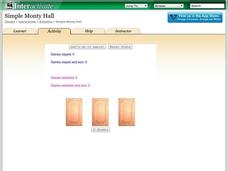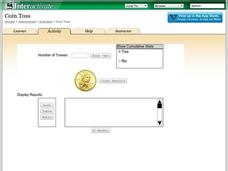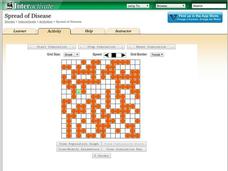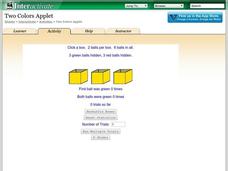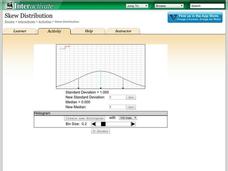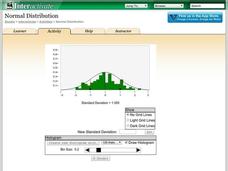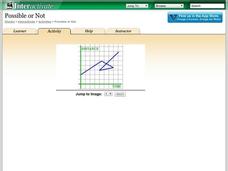Shodor Education Foundation
Regression
How good is the fit? Using an interactive, classmates create a scatter plot of bivariate data and fit their own lines of best fit. The applet allows pupils to display the regression line along with the correlation coefficient. As a final...
Shodor Education Foundation
Scatter Plot
What is the relationship between two variables? Groups work together to gather data on arm spans and height. Using the interactive, learners plot the bivariate data, labeling the axes and the graph. The resource allows scholars to create...
Shodor Education Foundation
Two Variable Function Pump
Use a function to operate on two variables. Pupils look at operating with complex numbers as a function of two variables. The interactive squares the input and adds a constant to it. Learners visualize the resulting output and its...
Shodor Education Foundation
Simple Monty Hall
What's behind door number one? A fun resource lets learners simulate the classic Monty Hall probability problem. Pupils choose a door, and after they select a losing door, they decide whether to switch or stay. Using their decisions, the...
Shodor Education Foundation
Buffon's Needle
Find the needle on a lined paper. Pupils run a simulation of dropping a needle on a lined paper. The probability of the needle crossing at least one line is pi/2. After each trial, the interactive displays the approximation of pi based...
Shodor Education Foundation
Coin Toss
Are your young mathematicians having a hard time making heads or tails of probabilities? It's no toss up—here is a resource that's sure to straighten them out! Learners run the interactive to toss a coin a different number of times....
Shodor Education Foundation
Overlapping Gaussians
Adjust the overlap to compare probabilities. Using sliders, learners adjust the shape of two Gaussian curves. The interactive calculates the area of the left tail for one curve and the right tail for the other. Pupils set the interactive...
Shodor Education Foundation
Spread of Disease
Control the spread of a contagious disease. An applet allows pupils to run a simulation on the spread of a disease. Rules govern how the disease is spread and the length of time it takes to recover. Learners view the spread visually and...
Shodor Education Foundation
Two Colors Applet
Find the box with two green balls. The applet uses six balls, three green and three red, and hides them in three boxes. Pupils choose a box and click on it to reveal the color of balls inside. Using the chosen box, the simulation keeps...
Shodor Education Foundation
Pythagorean Explorer
Make sure the measurement is right. The interactive provides right triangles with a missing side measurement. Pupils use the given sides and the Pythagorean Theorem to calculate the length of the missing side. After entering the length,...
Shodor Education Foundation
Stem and Leaf Plotter
The key is in the leaves. Pupils enter data to create a stem-and-leaf plot. The resource then displays the plot and calculates the mean, median, and mode of the data. Using the plot and the calculated measures of spread, learners analyze...
Shodor Education Foundation
Skew Distribution
Slide the class into a skewed view. Learners alter the location of the median relative to the mean of a normal curve to create a skew distribution. They compare the curve to a histogram distribution with the same skewness.
Shodor Education Foundation
Normal Distribution
Does the size of the bin matter? The resource allows pupils to explore the relationship between the normal curve and histograms. Learners view histograms compared to a normal curve with a set standard deviation. Using the interactive,...
Shodor Education Foundation
Multiple Linear Regression
You'll have no regrets when you use the perfect lesson to teach regression! An interactive resource has individuals manipulate the slope and y-intercept of a line to match a set of data. Learners practice data sets with both positive and...
Shodor Education Foundation
Possible or Not?
What does the graph mean? Pupils view 10 graphs and determine whether they are possible based on their contexts. The contexts are distance versus time and profit versus time.
Curated OER
Making Gateway Middle School Handicapped Accessible
Students discuss the situation at their middle school about being handicapped accessible. In groups, they identify the various types of handicaps and their accommodations. They create a blueprint of the building and make suggestions in...
Curated OER
Introduce Double-Digit Addition
Pupils generate a list of numbers then classify them into groups of single digit and double-digit numbers. After listening to a children's book about double-digit addition, they work with tens and ones blocks to solve double-digit...
Curated OER
Rounding Decimals
Fourth graders explore rounding a price given in dollar and cents to the nearest dollar. In this math lesson, 4th graders discover how to round to the nearest dollar. Additionally, students practice rounding money for objects that they...
Curated OER
Programs
Students discuss programs designed for people with disabilities. In this language arts and social studies lesson plan, students discuss programs started by the Kennedy family and create posters in order to share their findings.
California Academy of Science
Fraction Penguin
Exploring mathematics through art is a fun and concrete way to help learners grasp a concept. They will construct a paper penguin using fractions cut from circles. They'll need to determine 1/8, 1/4, and 1/2 of each circle. Once the...
Curated OER
Understanding Fractions
Fourth graders compare fractions by using skittles and m&ms. In this math lesson, 4th graders explore the size of different fractions by cutting pieces of their pie for visual representation. Additionally, students discuss ways to...
Curated OER
Factoring Trinomials
Students factor trinomials using specific factoring methods. For this algebra lesson, students factor equations using the difference of squares and foiling. They play a game to enhance their understanding of factoring.
Alabama Learning Exchange
The Five Senses: How They Relate to our World
Students explore the five senses and the significance of each sense. In this five senses and diversity lesson plan, students listen to You Can't Smell a Flower With Your Ear by Joanna Cole and take a walk observing opportunities to use...
Curated OER
Telling Time By the Hour
First graders explore how to tell time by the hour. They draw the minute and hour hands on a clock to match the time shown by the teacher on the overhead clock. Students write the time shown on a worksheet. They read "The Grouchy Ladybug."





